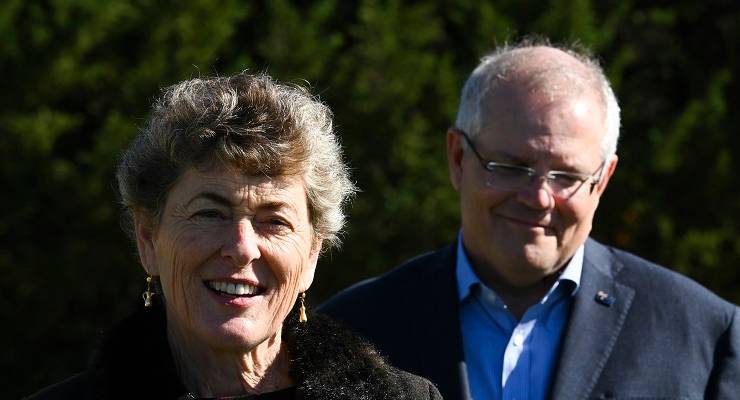
The new Eden-Monaro candidate’s shifting priorities on climate change, the press acts as stenographer for a speech that hasn’t happened yet, and Scott Morrison’s ship shifts course. Catch up with all the latest Tips and Murmurs from the Crikey bunker.
That was then, this is now
After a quite exquisite Coalition stoush for preselection, during which furious hedgehog John Barilaro and Andrew “Ferry McFerryface” Constance came and went, the candidacy for Eden-Monaro finally fell, Steve Bradbury-style, to Fiona Kotvojs. Having ditched $150,000 or so in government contracts, she opened her campaign with a “climate pledge”:
I believe that the climate is changing, I believe that humans contribute to that change in climate and I believe that we need to have a reduction in emissions.
Which is interesting, because as recently as August last year she was engaging in some absolutely classic denialism in the pages of The Australian Financial Review, arguing our focus on climate change in the Pacific was distracting us from “real” issues, like diabetes:
The focus of much of the media coverage of last week’s Pacific Leader’s Forum has been on climate change risk and how other countries in the neighbouring region, such as Australia with its large fossil-fuel sector, should respond. But what is largely ignored is whether climate change really is the greatest threat to Pacific island nations.
Press freedom watch
In another blow to press freedom in this country, Victoria’s Director of Public Prosecutions Kerri Judd has decided to proceed with charges of contempt against 11 publishers (and 19 individuals) over breaches of suppression orders covering the trial of George Pell.
Pell’s trials brought to boiling point long-simmering arguments between the media and judiciary around transparency in the Victorian court system. Today’s decision to put publishers in the dock seems another reminder about just who’s in charge.
Today in the Streisand effect
Liberal Senator Sarah Henderson — who lost her seat of Corangamite in the last election, only to replace Mitch Fifield in the Senate a few months later — has taken time out from her busy schedule as a cultural critic to launch defamation proceedings. Given the thick skin one needs to brave the world of politics, we’d assume it’s to correct some pretty serious and urgent misinformation?
Well, not exactly. She’s suing former Geelong councillor Jan Farrell, the alleged author of an account with around 150 followers, for two tweets gleefully reporting on Henderson’s election night loss, a little over a year ago. Written in a style we in the bunker like to call “PS I am not a crackpot“, the account uses the word “sycophant” a great deal across the 2300 or so tweets it spat out, largely concerning Henderson, over the six months it was active.
Unity ticket
As Crikey and other respectable media figures such as Michael Pascoe have long pointed out, the practice of politicians dropping speeches, or excerpts thereof, to newspapers the night before delivery is particularly self-serving.
It guarantees positive coverage, partly because journalists are usually only given quotes, rather than the full speech, so political minders pick and choose the angle they can get each outlet to cover; partly because journalists don’t have a whole lot of time to properly research the claims made in the speech, even if they had a full copy; and partly because if a journalist did criticise a speech to which they’d been given early access, you can be sure that’d be the last time they (or perhaps even their colleagues) got such access.
That said, the dropping of Scott Morrison’s National Press Club speech to be delivered at lunchtime today was especially egregious. Michelle Grattan ran an extended article on the speech around 15 hours before its delivery while Seven’s Tim Lester had filed a report for Seven news by late last night.
Which makes it all the more disappointing that no one has pointed out a particularly absurd part of the speech, in which Morrison “is expected to” talk about the need to “do what makes the boat go faster” — the boats, apparently, being a metaphor for Australian businesses.
Now, we might be revealing our age, but we can remember when Morrison was all about stopping the boats, not making them go faster. The only faster speed Morrison wanted from boats was back toward Indonesia. Still, maybe in the wake — no pun intended — of Home Affairs’ Ruby Princess tragedy, “stop the boats” has had to be officially retired?
Do you have a tip for us? Let us know.








Scott ‘Make-the-boats-go-faster’ Morrison has used that metaphor before, in 2018, with the same lack of any sense of irony as today:
https://www.abc.net.au/news/2018-09-22/scott-morrison-urging-mps-to-make-the-boat-go-faster/10291820
The owner of the Titanic wanted it to go faster too.
Interesting when scumo believes the floating zoo project the Ark was real and it only floundered about with no engines.
If anyone pretends to wonder why legacy meeja is on the nose and not worth feeding “if a journalist did criticise a speech to which they’d been given early access, you can be sure that’d be the last time they (or perhaps even their colleagues) got such access.” pretty much shouts the reason from the rooftops.
How is this “privileged access” not corrupt? What other privileges are accorded on which we are not aware?
Does it matter?
Not really.
Anyone who would trust a journalist has never met one in the flesh, on the loose.
Not a pretty sight.
She’s a Liberal, so she’ll say anything to gain power. The only thing they believe in is their own power.
With the gag orders having been lifted regarding Pell, why is Crikey still not allowing comment on articles relating to him and the courts’ decisions?